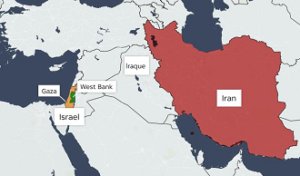
A piece in the chess of war
Since the fall of the monarchy in Iran, at the time Shah Reza Pahlavi, who was a traditional ally of the USA, the Islamic republic of Iran began to have hostility with the USA, which imposed sanctions because of the processing of uranium essential for nuclear bombs, making causing Iran to seek support and form alliances with Russia.
time Shah Reza Pahlavi, who was a traditional ally of the USA, the Islamic republic of Iran began to have hostility with the USA, which imposed sanctions because of the processing of uranium essential for nuclear bombs, making causing Iran to seek support and form alliances with Russia.
In 1st. April this year, Israel launched an attack on Syria (not assumed), killing Iranian generals, who have since promised retaliation and recently attacked Israel’s territory with drones and missiles, according to Rear Admiral Daniel Hagari, Israeli military spokesman: “it will launched more than 300 threats, and 99% were intercepted”, and concluded: “this is a success”.
Shortly before the news of the launch this Saturday (13/04), Israeli Prime Minister Benjamin Netanyahu said that “the defensive systems” are working, and that the IDF (Israel Defense Force), in a reprisal that was already As expected, the bombers continued yesterday (04/14).
As there are strong connections with Hezbollah and the Houthis to the south in Yemen and Hezbollah to the north in Lebanon there is also news of attacks on Israel, both the Israeli military command, the G7 and the UN security council have already called a meeting yesterday.
Italy and Germany have already spoken out against Iran, condemning the attacks, the USA and France helped intercept the missiles (it is reported that Jordan also helped the defense), so Iran is isolated in the West.
The objective at the moment is to prevent a larger scale attack on Iran, which would trigger an escalation of war in the region, Netanyahu must attack some targeted targets in Iran.
Russia has not commented so far, but it is a traditional ally of Iran, and the drones used in the attack on Israel are the same type as those used in the war in Ukraine.
Russian attacks continue to escalate in Ukraine with the main objective of depleting the country’s energy sources, the progressive fragility of the defense of Ukraine’s military forces makes the situation in the country, and to a certain extent in the NATO countries, quite dramatic.
Peace is always possible, what ethical forces call responsibility could play a decisive role in decision-making, as the leaders involved in the conflict increasingly seem not to understand the gravity of a conflict in the midst of a civilizational crisis.
After World War II, the forces in conflict understood the need for peace, now the worsening of the crisis, paradoxical as it may be, can make leaders call for peace.









